|
|
|
Sort Order |
|
|
|
Items / Page
|
|
|
|
|
|
|
| Srl | Item |
| 1 |
ID:
089891
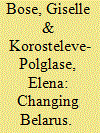

|
|
|
|
|
| Publication |
2009.
|
| Summary/Abstract |
Since the end of the Cold War, European Union (EU) efforts in transforming Central and Eastern Europe (CEE) have been enormously successful. The 2004 enlargement is widely regarded as the single most effective foreign policy strategy in the Union's history, and the recent European Neighbourhood Policy (ENP) was designed to repeat that success in countries located on the EU's new Eastern borders. Although the ENP has been the subject of substantive discussion in European academia, Belarus is the one country in Eastern Europe that has largely escaped scholarly attention.
|
|
|
|
|
|
|
|
|
|
|
|
|
|
|
|
| 2 |
ID:
090086


|
|
|
|
|
| Publication |
2009.
|
| Summary/Abstract |
Since the end of the Cold War, European Union (EU) efforts in transforming Central and Eastern Europe (CEE) have been enormously successful. The 2004 enlargement is widely regarded as the single most effective foreign policy strategy in the Union's history, and the recent European Neighbourhood Policy (ENP) was designed to repeat that success in countries located on the EU's new Eastern borders. Although the ENP has been the subject of substantive discussion in European academia, Belarus is the one country in Eastern Europe that has largely escaped scholarly attention. This article takes stock of recent developments in EU-Belarus relations and seeks to explain the very limited leverage of the EU over the country. We first examine the EU's relations with Belarus through the theoretical lens of external governance. By taking for granted the EU's ability to transfer its norms and values, however, the governance perspective does not account for the EU's very limited success in changing Belarus. We therefore revisit Michael Smith's notion of `boundaries of order' to highlight the impact of legal/institutional, transactional, cultural and geopolitical factors on EU-Belarus relations. We argue, in particular, that the existence and the construction of boundaries between the Union and its neighbouring states are essentially mutually constitutive processes. Besides shifting its own boundaries (and thereby extending its rules to outsiders), the EU is itself subject to the boundaries enacted by neighbouring states. In our conclusion, we juxtapose the notion of external governance as `rule transfer' with `partnership' as a more suitable mode of interaction between the EU and Belarus.
|
|
|
|
|
|
|
|
|
|
|
|
|
|
|
|
| 3 |
ID:
134130
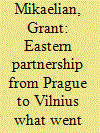

|
|
|
|
|
| Publication |
2014.
|
| Summary/Abstract |
On 28-29 November, 2013, Vilnius hosted the 3rd Eastern Partnership Summit, at which several former Soviet republics were expected to ascend to a higher institutional level in their relations with the European Union. Belarus and Azerbaijan preferred to step aside, while two other members (Armenia and Ukraine) left the program in the fall of 2013 when the talks were over. Georgia and Moldova initialed, but did not sign, the Association Agreement with the EU. This means that four-and-a-half years of this highly ambitious program produced very modest results, to say the least, very much due to the fact that Ukraine, the region's biggest player, excused itself from signing.This did not put a full-stop to the relations between the Eastern Partnership (EP) members and the EU, however the Vilnius Summit marked an intermediate finish of sorts. The old strategy ran into a dead end, leaving Brussels without a new strategy for its relations with its Eastern neighbors. To move forward, the EU should try to find out what went wrong. We should analyze what has happened and why. Here I have tried to comprehend how the relations between the EU and Soviet successor-states developed under the project to provide (probably delayed) answers to the following questions:
1. Did the summit fail because Russia was very skeptical about the results of European integration for its neighbors?
2. Why did this problem come to the fore in mid-2013 rather than in 2008 when it all started?
3. Why did the Russian factor (described as an imminent threat to the European programs on the post-Soviet space) remain neglected?
To correctly understand the motivation of what has been done and to avoid unsubstantiated assessments, we need to look at what happened in Vilnius from the perspective of Brussels, Moscow, and the post-Soviet capitals involved.
I will rely on the chronology of the EP project divided into three key periods:
-from May 2008 when the program was announced to May 2009 when it started;
|
|
|
|
|
|
|
|
|
|
|
|
|
|
|
|
| 4 |
ID:
134115
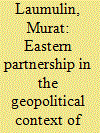

|
|
|
|
|
| Publication |
2014.
|
| Summary/Abstract |
The Eastern Partnership (EP) program should be viewed as another attempt to reformat the post-Soviet space along anti-Russian and anti-Eurasian lines and a response to Moscow's integration activities. This is not the first attempt of its kind: the West has already tried other geopolitical and geoeconomic tools. The final aim, however, has remained the same: Russia's domination and possible integration of post-Soviet regions irrespective of form, even economically adequate, should be prevented by all means.
|
|
|
|
|
|
|
|
|
|
|
|
|
|
|
|
| 5 |
ID:
154468
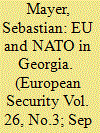

|
|
|
|
|
| Summary/Abstract |
Focusing on fragile Georgia since the early 2000s, the article takes a country-centred perspective on EU–NATO inter-organisationalism. It outlines the regional strategies of these core Western security institutions and assesses their complementarity and overlap across three sets of tasks: defence and empowerment, crisis management, and security sector reform. While there is hardly functional overlap in the first and second sets, in the third the EU and NATO intersect to a considerable degree. Also, there is no significant inter-organisational cooperation over Georgia. One key conclusion is that while field-level overlap clearly jeopardises institutional effectiveness, overlapping toolboxes – as in crisis management – allow for institutional flexibility when one international organisation setting offers reputational or practical advantages. Against this backdrop, a case can be made contra propositions of merging the Common Security and Defence Policy and NATO.
|
|
|
|
|
|
|
|
|
|
|
|
|
|
|
|
| 6 |
ID:
144077
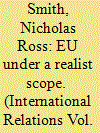

|
|
|
|
|
| Summary/Abstract |
This article breaks from the dominant liberal-idealist literature and examines the European Union’s (EU) foreign policy decisions from a realist perspective. Through employing a novel, EU-focussed neoclassical realist framework, the EU’s offer of a Deep and Comprehensive Free Trade Agreement (DCFTA) to Ukraine is argued as being a result of the mediating influence of its normative power role identity, the (mis)perceptions held by its foreign policy decision-makers and the institutional constraints inherent to its foreign policy decision-making process, which filtered systemic pressures (emanating from the European geopolitical setting) into the final foreign policy decision. Thereafter, this article assesses the EU’s responses to the Ukraine crisis, offering policy reflections and recommendations.
|
|
|
|
|
|
|
|
|
|
|
|
|
|
|
|
| 7 |
ID:
101009


|
|
|
|
|
| Publication |
2010.
|
| Summary/Abstract |
This article argues that the broad security discourse built into the European Union's (EU's) initiatives to the east, and specifically the European Neighbourhood Policy (ENP) and Eastern Partnership (EaP) have in practice not yielded the stability, prosperity and security sought after by the EU. Whilst the EU has pursued bilateral and multilateral processes of engagement through the ENP and EaP, the paradox has remained within its double security narrative and has often resulted in minimal change to the east, as well as contestation from eastern partners and regional actors such as Russia. The conclusion suggests that the EU must provide a more pragmatic, differentiated and balanced narrative, and thus process of engagement with the east if it is serious about creating a zone of peace, stability and prosperity.
|
|
|
|
|
|
|
|
|
|
|
|
|
|
|
|
| 8 |
ID:
171163


|
|
|
|
|
| Summary/Abstract |
By emphasizing concepts such as resilience and local ownership, recent updates in the EU's foreign policy strategy have marked a narrative turn and signaled a shift in EU external governance toward its neighborhood. This article has two aims. First, we unpack the EU's conceptual understanding of resilience and local ownership as reflected in its recent strategic documents. Second, we examine the implications of the EU's narrative turn on actual policy practices in Eastern Partnership countries. We highlight a gap between the EU's broad understanding of resilience and local ownership and the narrow operationalization of these concepts in the EU's eastern policy. The article shows that the EU continued relying on the previously established policy frameworks, according to which resilience develops through approximation with EU templates. This strong path dependence precluded any effective policy turn toward local ownership.
|
|
|
|
|
|
|
|
|
|
|
|
|
|
|
|
| 9 |
ID:
157262
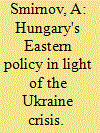

|
|
|
|
|
| Summary/Abstract |
THE ONGOING UKRAINE CRISIS has been a harsh trial for Russia and the European Union; it has been especially painful for countries that recently became members of a united Europe. The reasons for this are their territorial proximity to a hotbed of tension and their special historical relation to Ukrainian affairs. This is especially true for Ukraine's immediate Western neighbors: Hungary, Poland, Slovakia, and Romania. Their attitude to the situation is in one way or another associated with the problem of Ukrainian sovereignty, as it is understood and perceived by the government of each country.
|
|
|
|
|
|
|
|
|
|
|
|
|
|
|
|
| 10 |
ID:
128991
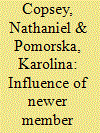

|
|
|
|
|
| Publication |
2014.
|
| Summary/Abstract |
This article seeks to examine and assess the role of Poland in the early stages of the making of the Eastern Partnership of the European Union. First, it briefly reviews Poland's aims and ambitions with regard to the European Union's policy towards its eastern neighbours, both before and since it joined the European Union in 2004. Second, it describes and analyses the Eastern Partnership, including its added value for the European Neighbourhood Policy. Third, it draws on a range of interviews carried out by the authors in Brussels and Warsaw on Poland's role in the initial formation of the Eastern Partnership, as seen by its partners in the other member states and European institutions. In addition, it seeks to unpack some of the early stage lessons learnt by the Polish government about how best to achieve its ambitions in the European Union, and notes the remaining weaknesses of the Polish administration, particularly in the area of administrative capacity.
|
|
|
|
|
|
|
|
|
|
|
|
|
|
|
|
| 11 |
ID:
130850
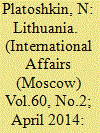

|
|
|
|
|
| Publication |
2014.
|
| Summary/Abstract |
In November 2013, Ukraine and several other former Soviet Republics declined and association with the European Union at the Vilnius Summit of Eastern Partnership.
|
|
|
|
|
|
|
|
|
|
|
|
|
|
|
|
| 12 |
ID:
174570
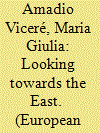

|
|
|
|
|
| Summary/Abstract |
My article addresses the role of the two post-Lisbon High Representatives (HRs), Catherine Ashton and Federica Mogherini, in EU approach to the Eastern neighbourhood. Adopting a broad conceptualisation of EU foreign policy and drawing on the scholarly literature on new intergovernmentalism, it focuses on events that marked the HRs' mandates in the cases of Kosovo and Ukraine. In the case of Kosovo, it examines the HRs' role in the conclusion of the so-called Brussels Agreement (April 2013); and of the August 2015 agreements. In the case of Ukraine, it reconstructs how the HRs dealt with the events leading up to the November 2013 Vilnius Summit; and with those leading up to the conclusion in February 2015 of the Minsk II Agreement. The article argues that the European Council exerts tight control over the post-Lisbon HR, and EU foreign policy-making processes more generally. Nonetheless, the empirical analysis demonstrates that, under certain circumstance, the HR can significantly influence EU foreign policy in the post-Lisbon era.
|
|
|
|
|
|
|
|
|
|
|
|
|
|
|
|
| 13 |
ID:
173292
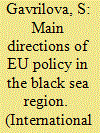

|
|
|
|
|
| Summary/Abstract |
THE BLACK SEA is a traditional crossroads of civilizations through which run currents of Orthodox Christianity, Islam and Western culture. Located at the crossroads of Europe, Central Asia and the Middle East, rich in natural resources, and containing significant economic potential, the Black Sea region is a strategically important zone. Its location and growing role in matters of energy transit are raising its geopolitical significance as a link between Europe and the Caspian region, while also playing a role in heightening security problems.
|
|
|
|
|
|
|
|
|
|
|
|
|
|
|
|
| 14 |
ID:
138060


|
|
|
|
|
| Summary/Abstract |
NEVER BEFORE, throughout its four-year history, has the Eastern Partnership (EaP) attracted so much attention as in the months that followed the Vilnius Summit of November 28-29, 2013 at which Ukraine did not sign the Association Agreement with the European Union. From the very beginning, the EU Eastern initiative raised many questions and invited criticism the vehemence of which depended on the critics' political positions. The results and, what was more important, the practical effects of this policy represented by the Vilnius Summit called for an urgent revision of the underlying concepts and their practical implementation and also motivations of the European initiative and European strategies of the key players and their allies. It proved to be even more important to register the attitude to it at all levels where it should have been formulated and was formulated at the very beginning.
|
|
|
|
|
|
|
|
|
|
|
|
|
|
|
|
| 15 |
ID:
191013


|
|
|
|
|
| Summary/Abstract |
The heterogeneity of the Eastern Partnership countries’ cultures, political regimes and foreign policy aspirations has been a challenge to the EU’s formulation of a coherent umbrella policy towards the region since the 2004 enlargement. Document analysis with a focus on region-level documents and the cases of Ukraine and Azerbaijan demonstrates the EU’s tendency to shift from an emphasis on European integration and common values to the sustainable development concept in order to address this challenge. By also taking into account the context of this tendency, this analysis highlights the need to balance sustainable development, integration efforts and democratisation in the Eastern Partnership amidst increasing differentiation between target countries and geopolitical pressures.
|
|
|
|
|
|
|
|
|
|
|
|
|
|
|
|
| 16 |
ID:
152547


|
|
|
|
|
| Summary/Abstract |
Studies on foreign policy think tanks have too often remained disconnected from the analysis of foreign policy outcomes. Yet, investigating the development, functions and influence of think tanks can provide valuable insights into the context in which foreign policy is formulated. The Czech Republic and Poland represent interesting comparative cases in this regard: while Polish think tanks are more numerous and tend to be better placed in international rankings, they are less involved in the policymaking process than their Czech counterparts. This contrast has mainly to do with the sociology of foreign policy elites and the role of political parties in both countries.
|
|
|
|
|
|
|
|
|
|
|
|
|
|
|
|
| 17 |
ID:
163654


|
|
|
|
|
| Summary/Abstract |
After Russia’s retreat from the European Neighbourhood Policy, the EU’s policy towards its eastern neighbours was split up. The internal unintended consequence of the EU’s choice to leave its policy unaltered was a tension between the objective of privileged relations with ENP countries and a promise to recognise the interests of Russia as an equal partner. Externally, the unintended outcome was that this fostered two opposing strategic environments: a cooperative one for the EaP and a competitive one with Russia. In terms of the management of unintended consequences, the EU has actively sought to reinforce its normative hegemony towards EaP countries, while at the same time mitigating certain negative unintended effects.
|
|
|
|
|
|
|
|
|
|
|
|
|
|
|
|
| 18 |
ID:
180707


|
|
|
|
|
| Summary/Abstract |
IN 2021, the Declaration on Cooperation between the Czech and Slovak Federative Republic, the Republic of Poland and the Republic of Hungary in Striving for European Integration1 that laid the foundation of the Visegrád Group will be 30 years old. These three decades have been filled with impressive successes and lamentable failures; with political ideas that kept them together or divided them. Moving to its next jubilee, the Group has preserved its importance in Europe supported by the Treaty of Accession of May 1, 2004, that made these countries EU members and has succeeded, to an extent, in attracting Brussels' political attention.
|
|
|
|
|
|
|
|
|
|
|
|
|
|
|
|
|
|
|
|
|